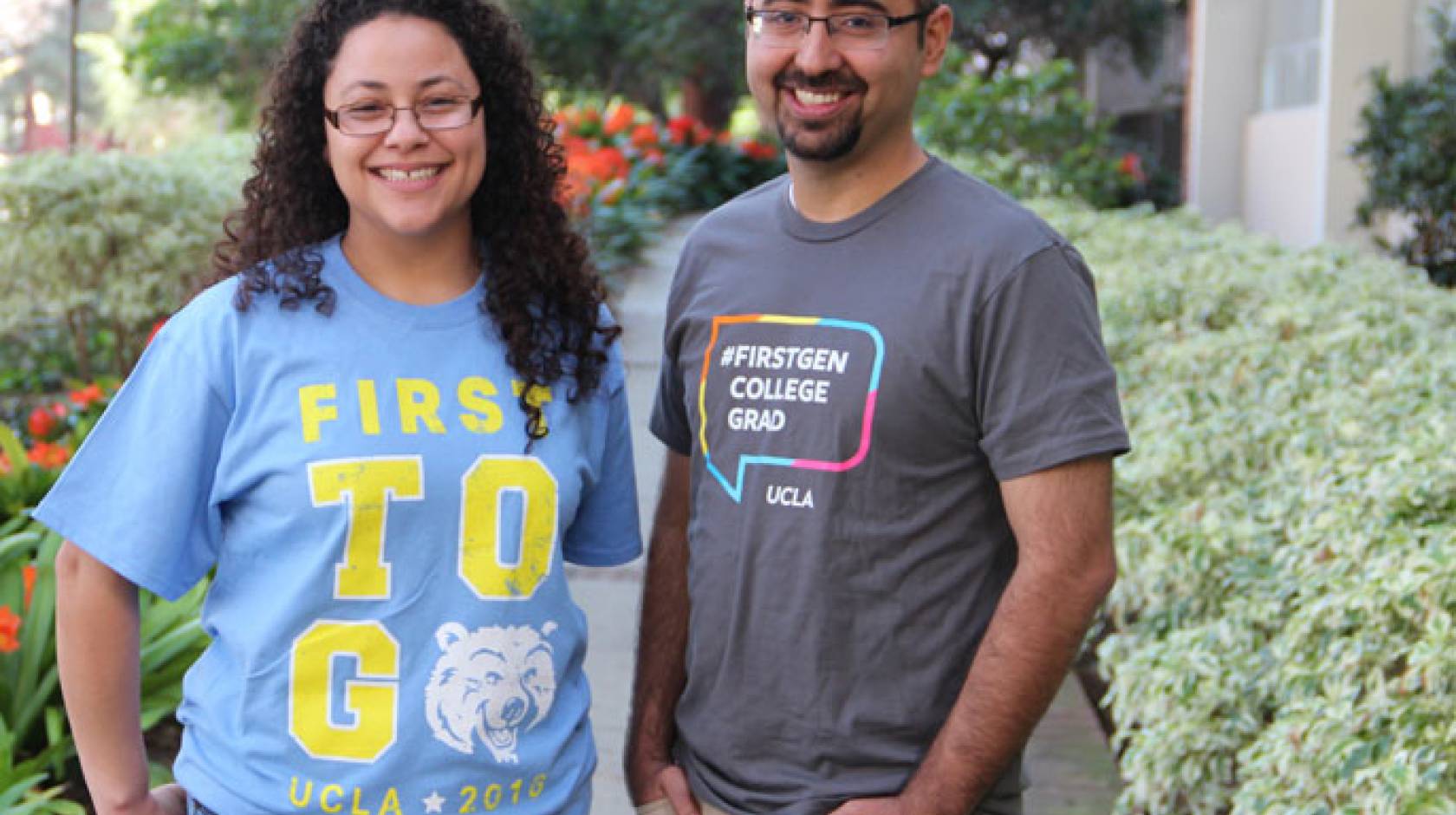Rebecca Kendall, UCLA

Gerardo Ramirez remembers his first day of college as one filled with conflicting emotions. He was eager and excited to be starting his freshman year at California State University, Northridge, but at the same time, he was apprehensive and anxious, and feeling a lot of pressure.
“The entire week before, I had nightmares that I couldn’t find any of my classrooms,” recalls Ramirez, who was not only navigating the physical campus but also entering the strange, new world of higher education as the first in his family to go to high school and college.
“I felt worried that I wouldn’t be able to do something as basic as find a class,” he says, “and that uncertainty in my abilities was a common concern for me throughout my undergrad years.”
Ramirez is now an assistant professor in UCLA’s Department of Psychology and one of approximately 100 UCLA faculty members, all former first-generation college students, who are participating in a new effort to offer support and encouragement to prospective and current first-generation UCLA students. More than 30 percent of UCLA undergraduates fall into that category.
Helping first-generation students feel connected
The UCLA First Generation Faculty Campaign is part of a broader effort to raise the visibility of first-generation faculty members across the University of California. At UCLA, the campaign is operating in collaboration with the First to Go program, which focuses on the retention and success of UCLA students.
“This campaign is intended to demystify the faculty rank for students and lets them know that behind the podium are many people whose roots are very similar to their own, and that a similar prestigious end is possible for them in whatever career path they are pursuing,” says Patricia Turner, senior dean of the UCLA College who was a first-generation college student who grew up in Sag Harbor, New York, where her mother cleaned houses and her father ran a farm in nearby Bridgehampton. Originally from Virginia, neither of her parents completed high school.
First-generation students commonly face unique challenges when coming to college, says Turner, including pressure to improve their family’s economic situation, a narrow understanding of academic and professional opportunities, and lack of mentors.
Turner, who attended State University of New York, Oneonta, and UC Berkeley, says that highly competitive schools like UCLA can be especially intimidating for first-gen students who sometimes believe that professors at UCLA, one of the world’s leading universities, couldn’t possibly relate to them on a personal level.
“Academic success is linked to students believing that they belong to the institution,” says Turner, noting that more than 90 percent of first-generation students at UCLA graduate. “Students need to feel connected, and the response we have received to this program reinforces my belief that our faculty members are deeply committed to the undergraduate experience at UCLA.”
It’s especially important for first-generation students to complete their studies and inspire other prospective first-generation students because of what a college degree can mean economically to their future, their families, communities and society. According to a study by the Georgetown Center on Education and the Workforce published in 2014, those who have bachelor’s degrees earn on average $1 million more than high school graduates over the course of a lifetime. In addition, Ph.D. holders earn $1 million more than bachelor’s degree holders.
Inspiring others to succeed
Credit: UCLA
Being in college won Ramirez respect among his siblings and other family members, many of whom looked to him as an example of what is possible with hard work and dedication to academics. He also was able to offer them one-on-one counseling — something many lower-income high school students often don't receive — and guide them on college admission requirements and financial aid and application deadlines, among other details.
As a college student, Ramirez avoided mentioning his first-generation status, but as a UCLA professor, he proudly shares his personal story with his students at the beginning of each quarter.
It’s this kind of support and perspective that inspired fourth-year cognitive science major and first-generation college student Denise Peralta to apply for graduate school after she completes her bachelor’s degree in June. “He (Ramirez) was the only professor to encourage me to go straight into a Ph.D. program. I wasn’t confident that I was ready, but, after hearing his story, I understood why he was pushing me, and I thought I could do it.”
Ramirez also opened her eyes to the importance of being involved in undergraduate research and helped her explore opportunities both at UCLA and other institutions. Peralta currently works in Ramirez’s research lab and hopes to one day teach math at a middle school similar to the one she attended in East Los Angeles. Her career aspirations are driven by a desire to foster a love of math and learning, and to serve as a positive role model.
“I want my students to see someone who looks like them, who came from the same neighborhood or one like theirs — and show them that success and a bright future are within their reach," Peralta says. "I want them to say, 'If she can do it, I can do it.’ And first-gen college students also need this kind of encouragement. This campaign gives us that.”
Advice from those who walked a similar path
Born in Brooklyn, New York, Paul Kroskrity became a first-generation college student after growing up in Long Island, New York, and later in Connecticut. He joined UCLA’s Department of Anthropology as a professor 40 years ago and served as chair of the American Indian Studies Program for 26 years. He believes that UCLA and the UC campuses in general are the perfect place for these efforts to flourish.
“The reason why this [First to Go] program is so good is that we have a really high quality institution, but we also admit students that are more diverse than those at the average university,” says Kroskrity, adding that UC campuses are an engine for social mobility. At other universities, he says, it’s not unusual for students who are the third or fourth generation in their families to attend college.
Kroskrity, who graduated from Columbia University and Indiana University, encourages first-generation students to get engaged, stay involved and not allow themselves to be constrained by self-imposed barriers or self-doubt.
“If you start limiting yourself by your own sense of what you are not capable of, or what you don’t know about, or how awkward you feel because it’s something new, you just don’t get the full experience,” says Kroskrity, whose mother didn’t complete high school and whose father was limited in his career because he lacked a college education.
“Take academic risks, talk to people that you might not have considered speaking to before, including your professors,” the UCLA anthropologist advises. “Reach out to people and get the full value of this experience. UCLA exists for them. You are not going to get these four years back, so use them in the best ways possible.”

